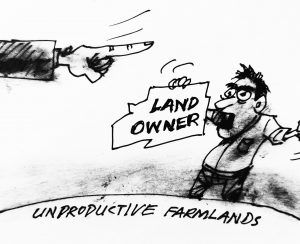In today’s food scarcity and rising prices of food products, lands that lay idle should be maximized for food production. Despite our being an agricultural country, plenty of our agricultural lands are still laying idle; thus, the government should intervene by penalizing landowners who cannot make their lands productive and giving such lands to those who can.
The issue of land productivity is a critical subject for discussion. Landowners have an inherent responsibility to utilize their land in a productive manner. There may be instances where conditions prevent them from doing so. In that case, then, they should give way to those people who can transform their land into highly productive areas, yielding plentiful harvests year after year. This the government should ensure, even if it means penalizing landowners who cannot make their land productive due to unforeseen circumstances or limitations that hinder productivity.
In determining suitable penalties for unproductive lands, it is crucial to consider the various barriers that might prevent landowners from utilizing their property optimally. External factors such as environmental constraints, economic downturns, or changes in zoning regulations can severely impact land productivity. For instance, if a region is affected by severe droughts or natural disasters, landowners may face challenges in cultivating crops or establishing profitable businesses. Recognizing and accounting for these external limitations is essential to avoid imposing unfair penalties on individuals who genuinely strive to make their land productive but encounter unavoidable roadblocks.
Any penalties imposed on unproductive lands should prioritize the promotion of sustainable and responsible land usage. Aside from just resorting to punitive measures, government agencies and land management organizations should offer support and resources to help landowners overcome obstacles hindering productivity. Financial incentives, educational programs, and collaboration with environmental experts can play a pivotal role in guiding landowners towards sustainable practices and alternative uses for the land. Encouraging partnerships between unproductive landowners and those who can utilize the land effectively could also provide an avenue for productive collaborations while promoting responsible land management.
Penalizing landowners who are unable to make their land productive should be approached with a comprehensive understanding of the factors that might inhibit productivity. It is vital to consider any external constraints that landowners may face and ensure penalties are fair and equitable. By taking a collaborative and nuanced approach, governments and land management organizations can facilitate the transformation of unproductive land into flourishing and beneficial assets.




